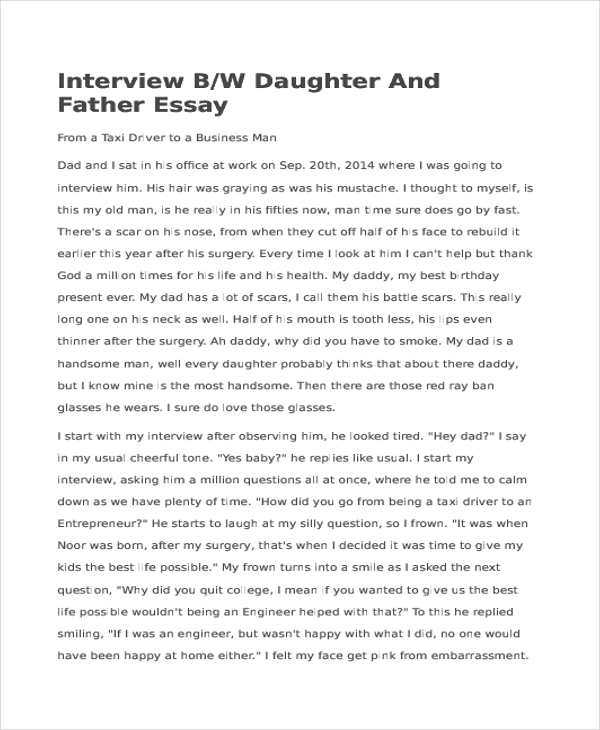5+ Interview Summary Examples
So you were tasked by your teacher to do an interview summary report or essay. Or maybe your superior asked you to. Or maybe it’s just a plain hobby you want to do. Either way, this task is not the easiest thing to accomplish. Aside from conducting interviews with your sources, you need to summarize the essential information you’ve got from them– something that might takes time since you might have acquired a lot of information. This might need a lot of time and energy , but with proper planning and organization, you can achieve writing a good summary report.
What is an Interview Summary Essay?
But first let’s ask: what does an interview essay or report mean? It’s not something you get to hear on a daily basis, and not something you hear anywhere else. Basically, it is an essay that look into different perspectives on a certain issue, or subject by using proof from interviews with different kinds of people. You get to ask questions to people and listen to their opinions and answers. These kinds of essays can be seen widely in magazines and newspapers. They will interview celebrities, socialites, politicians, and ordinary people. Here are some sample questions that can be asked to your interviewee:
Sample Interview Essay Questions
- How have standards of beauty changed over the years?
- What makes a piece of art beautiful to you?
- Are there any striking examples of beauty in art?
- How does the absence of beauty affect people?
- How important are strong family ties to you? Are strong family ties more or less important that close friendships?
- How have family roles changed from the past?
- What would growing up in an ideal family environment look like? Do you think that anyone grew up in an ideal family environment?
- What are the most common reasons for friendships to fall apart?
- What separates true friends from acquaintances?
- How much legal protection should journalists have?
- What kinds of corruption are found in journalism?
- Now anyone can be a journalist. Is this a good or bad thing? Why?
- What characteristics are important for a journalist to have?
The beauty of interview summary essays or report is that your sources are actual people, not from books or studies. You get also to touch a lot of topics and get to hear and know the different opinions of different people. To make your report or essay more meaningful and special, you can write about your family, friends, the people you look up to, etc. about a certain topic that you both could relate.
The Interview Process

- How do I do my interview? I don’t know where to start. These are the most common questions a novice would ask when they haven’t tried to do this type of exercise before. If you are going to interview a stranger, it might seem intimidating since you don’t know what sorts of questions they might answer. But don’t focus on this, there are most people who would love to answer your questions. Just pick a good question to make your interview interesting for them. One type of good questions to ask are something they can relate. For example, if you’re interviewing a teacher, ask her opinion about corporal punishment. Is it an effective way to discipline students? Arguable topics like this one are a bit touchy, so try to change your wording so you don’t sound accusing or offensive.
- It’s a good idea to interview your interviewee in person. You can see their facial expressions and the way they speak and behave. You can also establish a warm acquaintanceship with your interviewee if they can see you. However, if it is not possible, a phone or e-mail interview can do. The difference between a personal and phone interview is that confusion will take place in phone interviews. One person might not understand what the other is saying and which results to less effective communication. They’re might be a possibility you may get your facts wrong because one didn’t understand what the other is talking about.
- Now that you’ve formulated your questions, you’re ready to do the interview with your sources. You’ve sat down with them, asking if it’s okay to record the interview. This part is very crucial. Some interviewees might get angry about being recorded without permission. Ask first your sources if it is alright to record the interview. If not, don’t force them to say yes to your request. Bring a pad and pen to jot down their words.
- So you’ve started asking your interviewee some questions. Remember to ask one question at a time. Give them time to think and explain their answers. Don’t rush them or else their answers won’t sound so authentic. If they don’t understand your questions, elaborate your questions.
- Ask for follow-up questions when needed. If you want your interviewee to elaborate or explain clearly their answers, you can. Don’t be shy to do so as this will clear up any confusions.
- During the interview, don’t forget to take note of the following: their names, your questions, and their answers in quotations.
Student Interview Reflections Example
Interview B/W Daughter And Father Essay Example
Summary Report Example
Interview Summary Example
Public Administration and Law Enforcement Example
The Writing Process
Once you are done with your interview, only the half portion of your work is finished. Now comes the trickier part of the task. The first thing you need to do is the analyze the answers of your sources. Ask yourself these types of questions:
- What type of reason is this?
- How does this reason compare to other reasons?
- How important is this reason? Is this a valid one?
- What do you think of this reason? Is it valid?
Organize your notes logically. Arrange your notes from:
- most important to least information
- positive reason then negative
- the opinions you agree then disagree
- the uninteresting ones then to interesting
Outlining your interview summary
- Now that your notes are filtered properly with the important details that you need are highlighted, it’s time to start writing your paper. The interview summary can be written in a question and answer (Q&A) format or in a narrative form. Write down the information you need to include in each section of your paper. Make sure this information is vital in presenting an adequate summary of what you learned during your interview.
- Your summary report or essay should be informative. Put necessary details. If you are having difficulty in starting your summary, just write a rough draft. You can still revise your work later.
- Don’t forget to consult the guidelines your instructor or superior if they required you to follow. You may need to include information about how and where the interview took place. Be sure to include all the information required of you in your finished work.
- When inserting direct quotes from the interview, follow the proper citation. Paraphrase the information given to you by your sources; restructure their words into your own to avoid plagiarism issues.
Your Summary Must Include…
Introduction: Decide how you will introduce your essay. Your introduction may have the question you asked. Your opening might want to describe a situation which relates to your question. Example: In your introduction, open with a scenario about approaching a not-so good looking person and that person needs help from you. You are debating if he/she is worth helping or not. You may also use description, statistics, and/or questions in your opening (describe how people usually perceive standards of beauty and end with the question you asked in your interview). You could also begin with a dictionary definition, or a reference to a movie, T.V. show, song, or quote.
Body: List the reasons in order. The body of your essay should follow the order of reasons that you put together from your notes.
Conclusion: Your conclusion must be respond from all the information you’ve gathered. Conclude your summary with a paragraph or two explaining which point-of-view is the most valid, and why. Expound on these answers.
Now that you have gathered enough information and wrote your summary, it’s time for you to submit your paper. Once you’re used to it, writing an interview summary is an enjoyable and easy experience for you to try.







